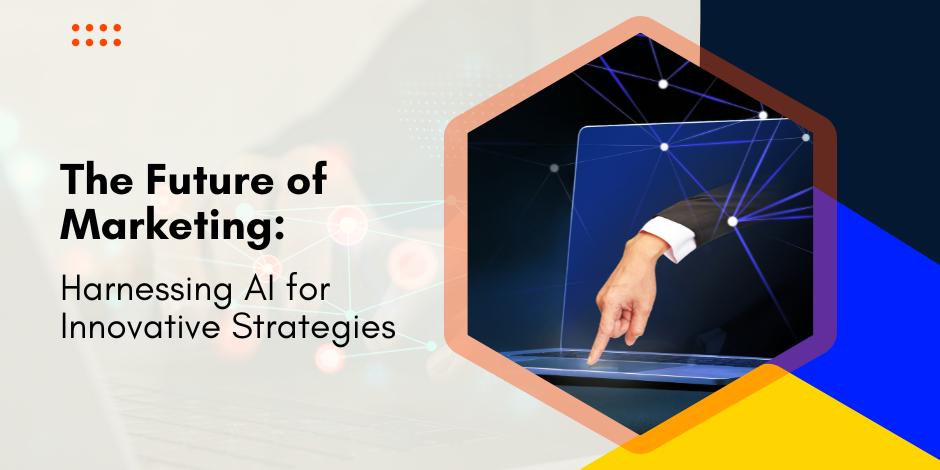AI in Marketing: Harnessing AI for Innovative Strategies

Stay Informed With Our Weekly Newsletter
Receive crucial updates on the ever-evolving landscape of technology and innovation.
In today’s fast-paced digital landscape, business leaders and marketers constantly seek innovative strategies to stay ahead of the competition.
The emergence of artificial intelligence (AI) has opened up a world of possibilities in marketing.
Understanding the role of AI in marketing is crucial for organizations that want to use this technology to their advantage.
Understanding the role of AI in marketing

In a marketing context, AI refers to using algorithms and machine learning (ML) techniques to automate and enhance marketing activities.
It empowers marketers to analyze vast amounts of data, gain invaluable insights, and make data-driven decisions.
The shift from traditional marketing strategies to AI-driven approaches has been fueled by the need to engage customers on a more personal level and deliver personalized experiences at scale.
Defining artificial intelligence in a marketing context
AI encompasses a range of techniques and technologies, including natural language processing (NLP), ML, deep learning, and predictive analytics.
These tools enable marketers to analyze customer behavior, preferences, and trends, allowing for targeted and personalized marketing campaigns.
By harnessing the power of AI, marketing professionals can optimize their strategies, improve customer engagement, and drive business growth.
The shift from traditional marketing strategies to AI-driven approaches
Traditional marketing strategies typically rely on demographic segmentation and generic messaging.
However, AI-driven approaches offer a more personalized and relevant approach.
By leveraging AI, marketers can develop a deep understanding of their customer base and tailor messages and recommendations to meet individual needs.
This level of personalization can enhance customer satisfaction and strengthen brand loyalty.
One of AI’s key advantages is its ability to analyze vast amounts of data in real time.
Marketers can instantly gain valuable insights into consumer behavior, preferences, and trends.
By understanding these patterns, marketers can identify new opportunities, optimize their campaigns, and stay ahead of the competition.
Moreover, AI can help marketers automate repetitive tasks, freeing their time to focus on more strategic initiatives.
For example, AI-powered chatbots can handle customer inquiries and provide instant responses, improving customer service and satisfaction.
This automation saves time and ensures consistent and accurate communication with customers.
Additionally, AI can assist marketers in predicting customer preferences and behavior.
By analyzing historical data and patterns, AI algorithms can forecast future trends, allowing marketers to anticipate customer needs and tailor their marketing efforts accordingly.
This predictive capability can significantly enhance the effectiveness of marketing campaigns and increase customer engagement.
The potential of AI in customer engagement and retention
One of the most significant advantages of AI in marketing lies in its potential to transform customer engagement and retention strategies.
AI has emerged as a powerful marketing tool, offering many opportunities to enhance customer interactions and loyalty.
By leveraging AI technologies, businesses can delve deep into customer data to gain valuable insights that drive personalized experiences and tailored marketing strategies.
Personalization and predictive analytics: A game changer
Personalization has become a cornerstone of successful marketing campaigns.
AI technologies enable businesses to gather and analyze vast amounts of customer data, thereby creating highly personalized experiences.
Marketers can deliver tailor-made recommendations, product offerings, and communication by understanding individual customers’ preferences, behaviors, and needs.
Harnessing the power of predictive analytics, AI can accurately anticipate customer needs and deliver proactive solutions, fostering stronger customer relationships.
Moreover, AI’s predictive capabilities extend beyond just understanding current customer preferences.
By analyzing historical data and trends, AI can forecast future behaviors, allowing businesses to stay ahead of customer demands and market shifts.
This proactive approach enhances customer engagement and boosts retention rates by offering timely and relevant solutions.
AI and the evolution of customer service
The role of AI in customer service is rapidly evolving.
AI-powered chatbots and virtual assistants can handle routine customer inquiries, providing real-time responses and support.
This automation improves efficiency and frees up human customer service agents to focus on more complex and high-value interactions.
AI-driven chatbots can provide round-the-clock support, ensuring customers receive prompt assistance whenever they require it.
Furthermore, AI’s integration in customer service goes beyond just resolving queries.
AI systems can understand customer sentiments and emotions through NLP and ML algorithms, enabling them to offer empathetic and personalized responses.
This human-like touch enhances the overall customer experience, building trust and loyalty towards the brand.
Ethical considerations in AI marketing

While the potential benefits of AI in marketing are vast, it is essential to consider the ethical implications that arise.
Striking the correct balance between personalization and privacy is crucial to avoid alienating customers and damaging brand trust.
Balancing personalization and privacy
AI gathers immense amounts of data to derive insights and deliver personalized experiences.
However, organizations must treat customer data responsibly and ethically.
Transparency and consent play a critical role in building trust.
Marketers must obtain customer consent for data usage and communicate how customer data is collected, stored, and used.
The role of transparency in AI marketing
Transparency is key to building and maintaining customer trust.
Marketers should provide clear information about using AI in their marketing efforts, highlighting the benefits and the measures in place to protect customer data.
By being transparent about data collection and usage, organizations can establish a more open and honest relationship with their customers.
Overcoming challenges in implementing AI in marketing
While the potential of AI in marketing is immense, there are challenges to overcome in implementing this technology effectively.
Addressing the skills gap in AI marketing
AI implementation requires a skilled workforce that can leverage technology effectively.
Organizations must invest in upskilling and training their marketing teams to develop expertise in AI-driven marketing techniques.
Upskilling employees and hiring professionals with AI and data science expertize will be crucial in driving successful AI marketing initiatives.
The importance of data quality and management
AI relies on high-quality data to generate accurate insights and make informed decisions.
Organizations must invest in data management practices that ensure data accuracy, integrity, and security.
Implementing robust data quality measures will ensure that AI-powered marketing activities are based on reliable information.
AI in modern marketing: The future

The use of AI in marketing is set to grow rapidly in the coming years, with emerging trends and innovations reshaping the industry.
Emerging trends in AI marketing
Marketers can expect to witness new trends and applications as AI technologies advance. One such trend is the integration of AI with voice-activated devices, such as smart speakers.
Voice-activated technology presents new opportunities for marketers to engage with customers through voice-activated ads and personalized voice interactions.
Preparing for an AI-driven marketing future
Organizations must embrace AI and be prepared to stay ahead for the changes it brings.
Developing a comprehensive AI marketing strategy, investing in AI tools and technologies, and fostering a culture of innovation will be key to succeeding in an AI-driven marketing landscape.
Conclusion
Harnessing the power of AI in marketing offers unprecedented opportunities to engage customers, drive personalized experiences, and propel business growth.
By understanding the role of AI in marketing, marketers can leverage AI technologies to overcome challenges, address ethical considerations, and shape the future of marketing in an ever-evolving digital landscape.
Are you ready to see where upskilling in digital marketing can take your career?
The Institute of Data offers accredited tech programs for those new to tech or seasoned professionals looking to pivot.
Choose us as your learning partner for flexible learning, extensive resources, and a community of like-minded professionals.
Visit our programs page to learn more, or book a complimentary call to discuss our programs in more detail.





